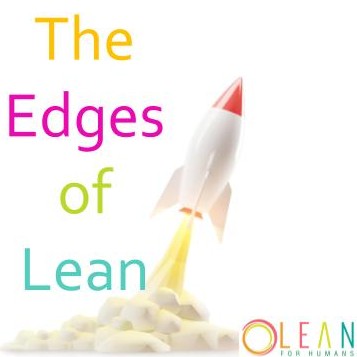
16.6K
Downloads
139
Episodes
The Edges of Lean explores topics in continuous improvement (lean thinking, creative problem solving, six sigma) that get overlooked. Meet the people practicing lean in odd places or with different twists, always with a focus on respect for people and continuous learning.
The Edges of Lean explores topics in continuous improvement (lean thinking, creative problem solving, six sigma) that get overlooked. Meet the people practicing lean in odd places or with different twists, always with a focus on respect for people and continuous learning.
Episodes
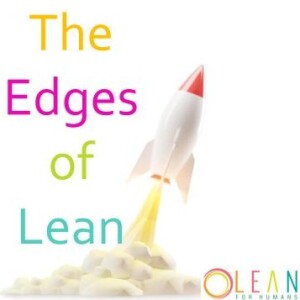
Wednesday Oct 05, 2022
Ep 69 Continuously Improving Your LinkedIn Profile with Daniel Alfon
Wednesday Oct 05, 2022
Wednesday Oct 05, 2022
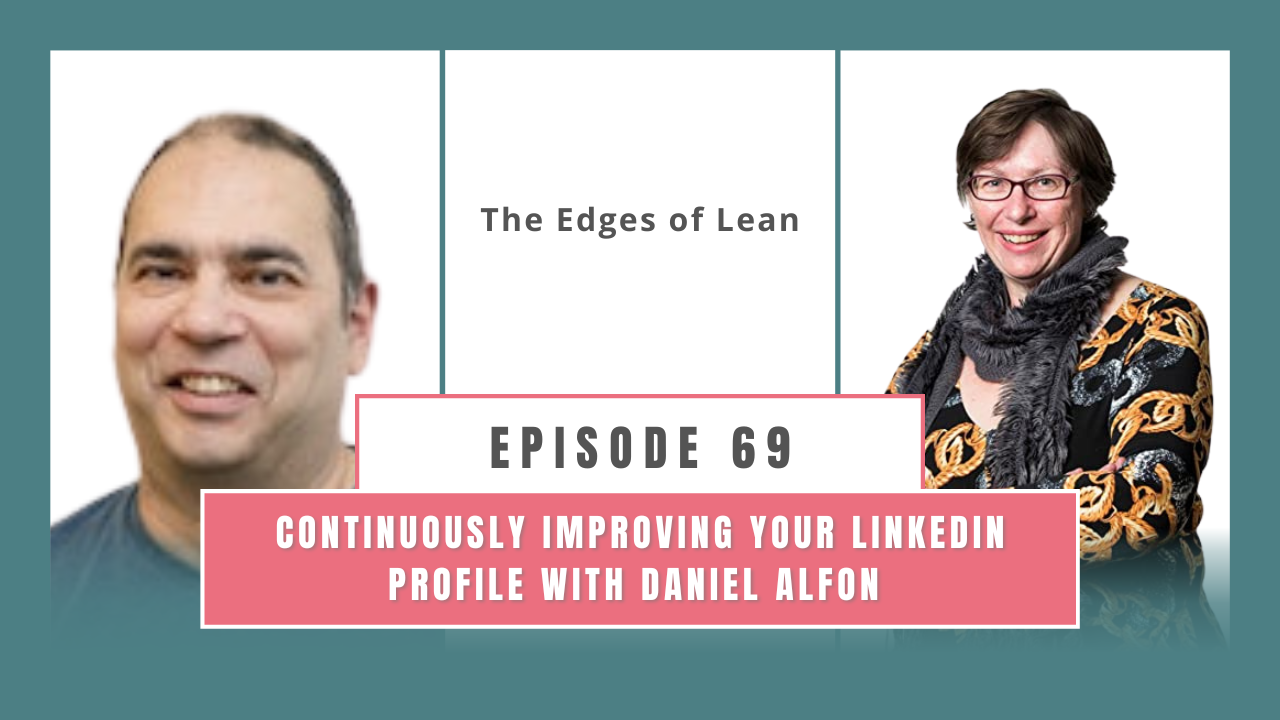
Continuously Improving Your LinkedIn Profile with Daniel Alfon
When I first created my LinkedIn account, I added my name, and a nice picture and uploaded my resume. It turns out, for those of us who work as consultants and coaches, those resumes on LinkedIn don’t do much to help us connect with clients. Daniel Alfon is a LinkedIn expert, and he blew my mind with his insights in this conversation. Note: I updated my LinkedIn page live as we recorded the show. So, for the full effect, check out this episode on YouTube. https://youtu.be/QM9NB4F0HKE
LinkedIn is a powerful tool for career growth and finding new positions. It's a great way to get connected with people who can help you grow, and it's also great at helping you find new connections. When, like so many lean and continuous improvement professionals, you strike out as an independent consultant, you need to use LinkedIn differently.
About Daniel John
Daniel is the author of Build a LinkedIn Profile for Business Success. Daniel joined LinkedIn in early 2004 and publishes articles, interviews, and exclusive content about advanced LinkedIn strategies to clients and subscribers on his website, www.danielalfon.com.
KEY TOPICS IN THIS PODCAST:
- 0:02 Continually improving your LinkedIn profile with Daniel Alfon.
- 2:06 Daniel’s LinkedIn profile as a way to connect with customers.
- 7:36 Who’s your ideal reader on LinkedIn?
- 12:55 How to make it easier for people to reach you on LinkedIn.
- 17:40 How to make your LinkedIn experience section easier for people to understand.
- 23:04 How to streamline your LinkedIn profile to be more aligned with what you’d like to do.
- 24:47 How to make it easier for people to reach you.
- 30:20 Do we need a massive network? Or do we need a focused network?
- 32:07 Make sure that your credentials speak for themselves.
- 33:42 Why you need to increase your social media presence to get more exposure.
- 35:30 How to use LinkedIn’s new “Add a Link” feature to your profile.
- 38:27 The importance of having a social media profile.
- 40:39 How do you find out who you can connect with?
KEY TAKEAWAYS
- When a prospective employer, searches for you on Google. LinkedIn will be the first one to appear in the search.
- One of the main advantages of having a robust LinkedIn profile is that even if you are not looking for a new position it’s a way for you to be engaged with your industry.
- When you want to create a business, consider your LinkedIn profile to be a website for your ideal prospect to find and contact you.
- Provide content in your LinkedIn profile.
- Remember to stay in touch with your connections at school when you build your LinkedIn profile. People don't like it when we just connect and talk to them when we need them.
Memorable Quotes from Daniel Alfon
“ People don't like it when we only remember them when we need them.
CONNECT WITH DANIEL ALFON
TWITTER: https://www.twitter.com/danielalfon
LINKEDIN: https://www.linkedin.com/in/alfon
EMAIL: linkedinbusinessdanielalfon@gmail.com
WEBSITE: https://www.danielalfon.com/

Wednesday Sep 28, 2022
Ep 68 Continuously Improving your SEO with Brandon Leibowitz
Wednesday Sep 28, 2022
Wednesday Sep 28, 2022
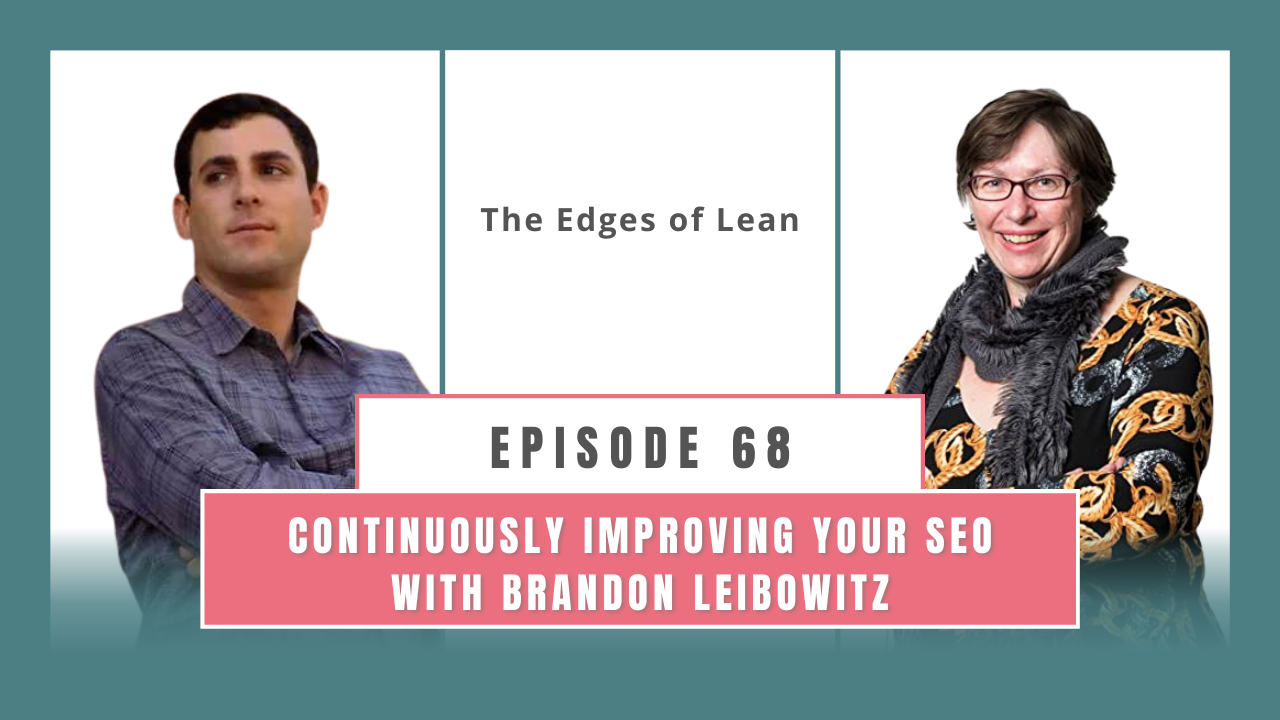
Do you have a website? If you're like me and have a website (like I have at leanforhumans.com), you know that you need to work on your search engine optimization (SEO). And if you're like me and most others, how to do that can be a complete mystery. Brandon Leibowitz says that we should all get as much free real estate on search engines as possible and that it's not all that mysterious. SEO is just another thing to continuously improve. But you need to know how search engines themselves continuously optimize. He's here to explain it.
About Brandon Leibowitz
In 2007, Brandon got his first job after he graduated from college. His job was helping out a company with its digital marketing, social media, SEO, email marketing, and running paid ads. He then realized that everyone would probably be on the website in the future and there are a lot of ways to get traffic but SEO is a way to get free traffic. He thought that he doesn't have to spend money on paid ads but rather he could get there for free.
He focused on SEO over the years and helping out people get free traffic by working with different advertising agencies. On the side, while he was working, he would build his own business up and grow it until he was able to quit his job and solely focus on it, and that is what he does until today.
KEY TOPICS IN THIS PODCAST:
- 0:54 - 1:52 Brandon’s career background
- 2:24 - 3:52 What is SEO and why is it important for people to know about SEO?
- 4:27 - 5:56 Importance of being clear to your audience about what you are offering
- 5:57 - 6:39 Why is it more important to focus on the user than on keywords
- 6:42 - 8:02 Google Search result as a place to continuously optimize
- 8:07 - 10:25 What does it mean to focus more on the audience?
- 10:57 - 15:02 How SEO increases the stickiness of the website?
- 15:26 - 17:17 What is an SEO title tag?
- 19:54 - 22:20 Where does Brandon see the search going in the future?
- 22:22 - 24:39 Does Brandon watch other people use search engines and see what they do?
- 22:43 - 26:20 What are the things to consider for someone who is getting started in a business when setting up a website?
- 26:27 -28:14 Importance of reviews on websites for businesses
- 28:14 - 30:23 SEO and its use in social media
- 30:27 - 31:47 Mistakes made while optimizing keywords
- 31:59 - 34:19 What are the most recent changes happening in search engines?
- 35:26 - 36:22 What part does AI play a role in SEO?
- 37:35 - 39:09 Brandon’s advice to young people that are starting their career
KEY TAKEAWAYS
- Search engine optimization is very useful to businesses and organizational websites because it allows people to discover your product or service.
- It is more important to focus on the needs of the customers rather than the choice of keywords on your website.
- Being clear and concise on what your business offers ideally brings your website to the top of search engine rank and makes it more visible to your target audience.
- When getting started on your business, it is important to have a clean minimalist website to clearly define your offering.
- Getting reviews and feedback on your website helps show the credibility of your business.
- In getting started in an SEO career, it is important to have mentors to guide you even if they are not experts in your specific niche as they can provide you with a broad industry perspective.
Memorable Quotes From Brandon Leibowitz
“For anyone that's just starting, I would say getting a mentor that's helped out over the years is having someone else that's been around to guide you, even if they're not an expert in your field.”
CONNECT WITH BRANDON LEIBOWITZ
Website: https://seooptimizers.com/

Wednesday Sep 21, 2022
Ep 67 Continuous Improvement and Task Balancing with Kevin Gazzara
Wednesday Sep 21, 2022
Wednesday Sep 21, 2022
One of the secrets of getting to “flow” in a work process is to “level the load.“
Not overburdening the process and managing the natural volatility of inputs has a remarkable effect on productivity. My guest, Kevin Gazzara, has insights into how to do this in our brains. Check out our fascinating conversation!
Kevin has an undergraduate degree in engineering and business and completed his MBA and doctoral work in Organizational Leadership. Kevin then moved to the technical side when he worked for Transamerica Corporation. He also worked at Intel for 18 years as an Operations Manager and General Manager, and in his last 10 years at Intel, he focused on managing Intel University and the Management Leadership Development, as well as residential programs around the world.
Currently, Kevin is a senior partner at Magna Leadership Solutions, a firm that started 15 years ago when he retired from Intel in 2007. Magna Leadership Solutions provide management and leadership programs including the Lean Forward Academy which offers global programs virtually and in person. In addition, he is an ICF (International Coaching Federation) executive coach, and Positive Intelligence coach.
KEY TOPICS IN THIS PODCAST:
- Kevin’s background before he started Magna Leadership Solutions
- What made Kevin transition from the technical and business side to the organizational side of the organization?
- His big leap, moving from engineering to the people side of the business.
- The difference between leading a technical team and being a leader training teams from all over the company.
- Kevin’s ideas, principles, and how he deals with how other people see and perceive things.
- Three commandments of leadership
- What does Kevin do to help other people get deeper knowledge and become more flexible with their approach?
- Why communication is by far the number one missing leadership practice or competency across the globe.
- Systems influencing the performance of the team
- Organizational performance and aligning it to business results
- Why do organizations obscure the cost of turnover?
- What managers should do to improve problem-solving.
- Why managers should balance their employees’ workload and how to balance the workload for your brain.
KEY TAKEAWAYS
- No one can do one type of task effectively for extended periods. Changing task types throughout the workday leads to better overall productivity and happier employees.
- Allowing people control over the types of tasks they perform and when and how long they perform them will allow people to gravitate towards what they love.
- When you can retain employees, you are always going to get better performance, engagement, and motivation.
Memorable Quotes From Kevin Gazzara
“Go find someone to mentor you or to coach you… to be a sounding board for you.”
CONNECT WITH KEVIN GAZZARA
Main website: https://magnaleadership.com/
Positive Intelligence website: https://pqtrainingandcoaching.com/

Wednesday Sep 14, 2022
Ep 66 Continuous Improvement and Becoming a Coach with Sam Morgan
Wednesday Sep 14, 2022
Wednesday Sep 14, 2022
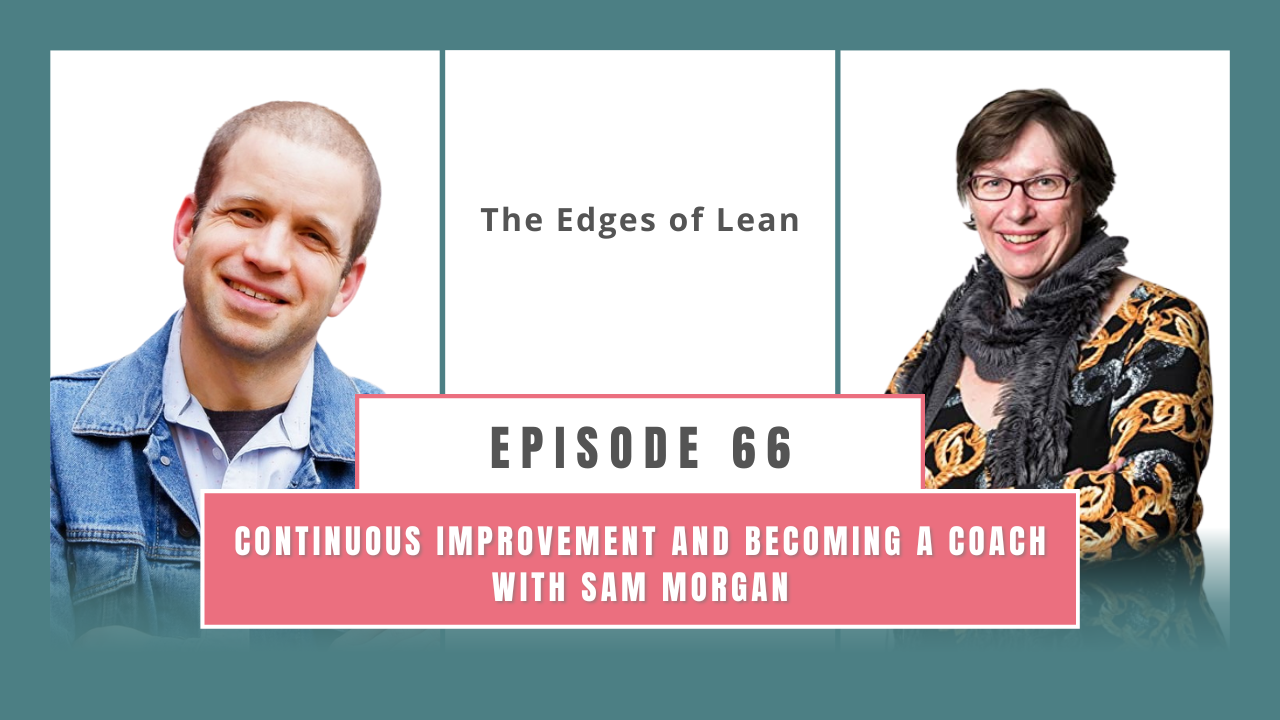 The role of a good coach in continuous improvement is a key to CI success.
The role of a good coach in continuous improvement is a key to CI success.
At some point, we all need to step into the role of a coach whether as a leader, a professional coach, or simply coaching others in our day-to-day interactions. Sam Morgan has been developing his coaching skills but had to overcome many obstacles to become a confident coach. I invited Sam back to the Edges of Lean to talk about his growth as a coach and what he has learned as he gains experience and expertise as a coach.
About Sam Morgan
Sam is a self-proclaimed “confident learner” and earlier this year after 5 years of practice in the continuous improvement space he landed at KataCon, a conference for continuous improvement professionals who practice the Toyota Kata (Helping managers develop coaching skills). There he had a powerful moment realizing where his true passion lies, transforming people through coaching.
Ever since then he has been on a mission to help folks illuminate who they are, and what they were created to do, and give them the confidence to live it through the powerful practice of daily coaching.
Sam is looking to change the lives of people through the process of uncovering their PURPOSE, helping them understand the PATTERN of the Improvement Kata, tied together through the PRACTICE of daily coaching cycles.
Sam takes joy in seeing his clients move from fearful to fearless; from insecure to confident. He resonates deeply with the quote from Henry David Thoreau “Go confidently in the direction of your dreams.”
KEY TOPICS IN THIS PODCAST:
- 01:26-05:47 Sam’s career background
- 05:48-08:20 How does Sam overcome impostor syndrome in starting his coaching career
- 08:21-11:56 The importance of self-awareness being a coach
- 12:12-20:48 What is Improvement Kata all about?
- 21:06-24:28 Sam’s advice to people who are afraid of stepping out on their own
- 24:30-28:57 His unique way of inspiring others to have a clear vision of purpose
- 29:36-33:44 What experiences helped him to serve the clients better?
- 33:45-36:39 Top skills that coaches must have
- 36:42-38:30 What type of clients does Sam work with?
KEY TAKEAWAYS
- Coaching can be useful in the personal development sphere, helping individuals to overcome obstacles and reach their full potential.
- Overcoming impostor syndrome is a journey, but it is well worth taking if you want to reach your full potential as a coach and serve clients confidently.
- By valuing yourself first and having self-awareness you will be able to develop into a more effective coach who can help others reach their full potential.
- The Improvement Kata is a core component of the Toyota Kata practice, which is designed to help individuals and organizations continuously improve their performance
- Being a great coach is about more than just asking the right questions. It's also about being a great listener
Memorable Quotes from Sam Morgan
“ What is my purpose? For me, it's being a light, encouraging, empowering, being someone who provides hope and inspiration. And that brings passion and all the things that the different elements of light are how I want to show up.”
CONNECT WITH SAM MORGAN
LinkedIn: https://www.linkedin.com/in/samuelvictormorgan/

Wednesday Sep 07, 2022
Wednesday Sep 07, 2022
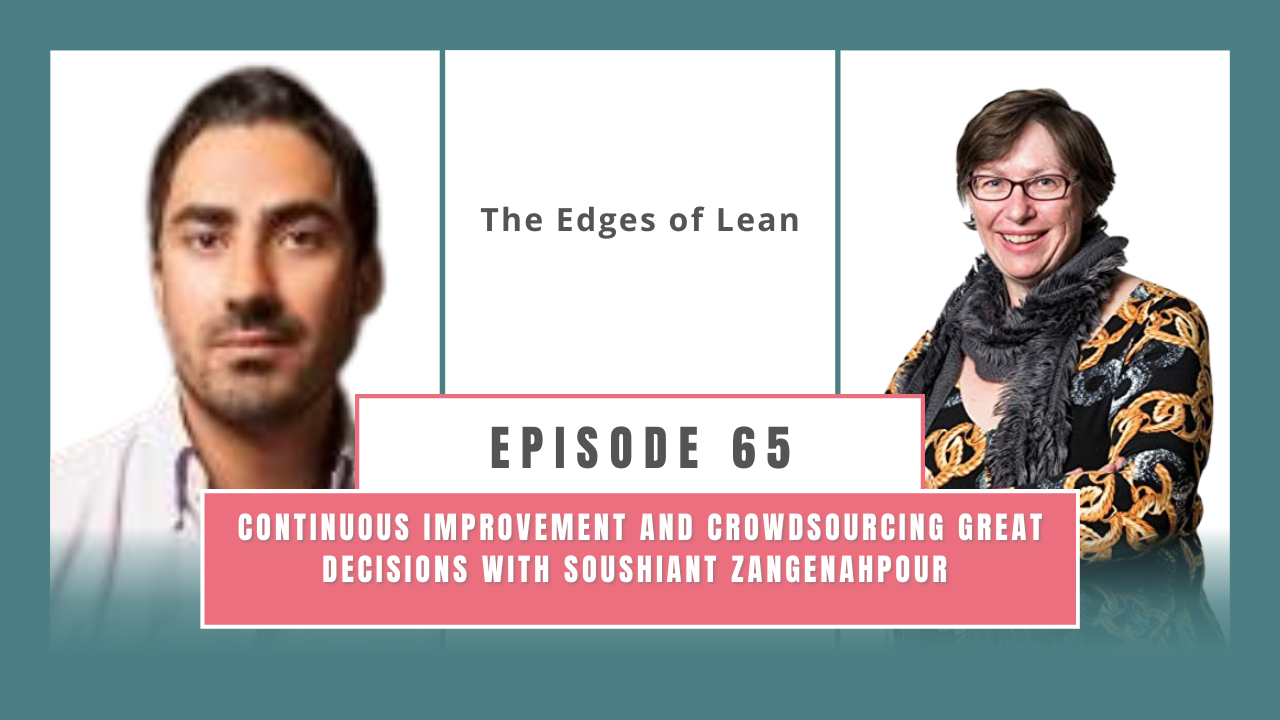
In Lean, we know the value of getting ideas from the people who are doing the work, especially when it comes to ideas for improvement. But what happens when your organization feels like it is too big to get ideas from everyone effectively? What if you're just too far away? Soushiant Zanganehpour is a social scientist and an entrepreneur, and he is the founder and CEO of Swae, a platform for crowdsourcing innovation, and making inclusive decisions powered by artificial intelligence. Let's hear what he has to say.
About Soushiant Zanganehpour
Soushiant is a social scientist and entrepreneur. His career spans the fields of policy-making, impact investing, social entrepreneurship, and sustainability. He focuses on upgrading inclusivity and democracy within companies and transforming democratic institutions to be 21st-century compatible.
He is the Founder & CEO of Swae, an award-winning idea management, and decision-making platform, powered by AI and bottom-up decision-making.
KEY TOPICS IN THIS PODCAST:
- 01:32-02:50 Soushiant’s career background and What Swae is all about
- 02:51-08:12 The most common problems of companies/organizations that need attention
- 08:13-10:41 The importance of decentralized decision-making in a crowd-sourced environment.
- 10:43-15:50 Disadvantages of hierarchical structure
- 15:51-19:57 What are Decentralized Autonomous Organizations(DAO) and how do they work?
- 20:14-30:05 A confluence of trends presentation explained from a Free Fall of Trust to Decentralization to Personalization to changing demographics to social movements and finally leading to changing of guard.
- 30:06-39:18 How the Swae platform supports anonymity when it comes to idea-sharing
- 39:21-42:18 Things that next-generation leaders need to be paying attention to
- 42:37-45:06 Soushiant’s advice for young people who are starting their careers
KEY TAKEAWAYS
- A DAO is an organization represented by code that is running on a decentralized network of computers, rather than a single central server. Because DAOs are code-based, they can be run completely transparently and autonomously. This means that DAO decision-making can be done without the need for a hierarchical structure or central authority
- One of the main disadvantages of a hierarchical structure is that it can lead to a high level of bureaucracy. This means that there are a lot of rules and regulations and decision-making takes a long time
- Swae is a decentralized software platform that helps organizations to make better decisions. It does this by providing a protocol for decision-making and crowdsourcing.
- Anonymous idea-sharing can help to prevent bias, as employees are less likely to be influenced by the opinions of others.
- When employees feel like their voices matter, they are more likely to stick around.
Memorable Quotes From Soushiant Zanganehpour
“ Don't waste your time trying to reform systems that are inherently designed for the past, build something different”
CONNECT WITH SOUSHIANT ZANGANEHPOUR
TWITTER: https://twitter.com/soushiant
LINKEDIN: https://www.linkedin.com/in/soushiant/
MEDIUM: https://medium.com/soushiant
EMAIL: soushiant@swae.io
WEBSITE: https://swae.io/
SWAE OVERVIEW (A CONFLUENCE OF TRENDS): https://drive.google.com/file/d/1WY46tdfwcw9p3ksjbMNEFhrB52u0Y3Wk/view?usp=sharing

Wednesday Aug 31, 2022
Ep 64 Continuously Improving Your Cognitive Functions with ST Rappaport
Wednesday Aug 31, 2022
Wednesday Aug 31, 2022
Practicing Lean changes your brain. Do you agree? I know for me, repeating the patterns of the Plan-Do-Check-Act, or the pattern of the improvement kata, and because of using and adapting lean tools, I think very differently from the way I used to think. This conversation with ST Rappaport illuminated what cognitive functions we are improving when we practice Lean thinking, and why that practice works. I think you will be as fascinated as I was when you meet her.
About ST RAPPAPORT
ST is a productivity coach, who like many people, struggled to be more efficient and effective - until, she says, she changed the way her brain is wired. Now she helps others, through her organization, LifePix University. LifePix University helps growing entrepreneurs solve their core problems so they can become more efficient and effective in their personal and professional life.
KEY TOPICS IN THIS PODCAST:
- ST’s career background
- How did she get into teaching about the growth mindset?
- What is Feuerstein's Method?
- How does Feuerstein's Method help ST with her reading difficulties?
- The connection between a Growth Mindset with Feuerstein's Method
- Cognitive function explained
- How cognitive deficiencies affect people’s emotions
KEY TAKEAWAYS
- A growth mindset is a belief that abilities and intelligence can be developed with effort and practice. This mindset is in contrast to a fixed mindset, which is the belief that abilities are set in stone and cannot be changed.
- Practicing lean thinking may be a way for people to develop their cognitive functions.
- Reuven Feuerstein's method is a cognitive intervention program. The goal of the program is to improve cognitive functioning in individuals with brain injuries and other cognitive impairments.
- Cognitive function refers to the ability to think, learn and remember. It is a broad term that encompasses many different mental processes, including attention, planning, problem-solving, decision-making, and working memory.
- Understanding how your brain works can help you to learn new things more easily and to use your strengths to your advantage.
Memorable Quotes From ST Rappaport
“ Time-saving was the best thing. This is part of the challenge with cognitive functions because we're so used to doing it the same way. We think this is the right way and this is the best way to do it. “
CONNECT WITH ST RAPPAPORT
https://www.lifepixuniversity.com/
https://www.linkedin.com/in/st-rappaport-869b7619b/
https://www.instagram.com/lifepixphotography/
https://www.youtube.com/channel/UCqwMNmGg9DS0ebpDZZ-Ff3A
https://www.tiktok.com/@lifepixuniversity

Wednesday Aug 24, 2022
Ep 63 Continuous Improvement and the CFO Who Didn’t like Math with Kevin Palmieri
Wednesday Aug 24, 2022
Wednesday Aug 24, 2022
In continuous improvement, we love our numbers. Data is the bedrock of knowing what our current situation is, and whether we are improving. Kevin Palmieri is the CFO, Founder & Co-Host of Next Level University, a Global Top 100 Self-Improvement podcast with more than 1000 episodes reaching over half a million people in more than 125 countries. Kevin and his business partner are all about helping people to continuously improve – and Kevin started out not really being a numbers guy. But he changed his mind. Let’s hear how it happened.
Kevin Palmieri
Kevin is the Founder, CFO & Host of the Next Level University, a Global Top 100 Self-Improvement podcast with more than 1000 episodes reaching over half a million people in more than 125 countries on how to improve your life, love, health & wealth
KEY TOPICS IN THIS PODCAST:
- Kevin’s career background
- How he started podcasting
- How he was introduced to math and why he didn't like it
- How he faced and embraced math
- Why must businesses continuously improve their system?
- Growth is crucial for every relationship
- How does he understand the value of math now?
- Leaders' biggest organizational continuous improvement challenges
KEY TAKEAWAYS
- Growth is essential for fulfillment. Without it, we would be stuck in the same place, both figuratively and literally. We would never learn or experience new things. We would never reach our potential
- By taking the time to identify and address our bad habits, we can make positive changes that will have a lasting impact on our lives.
- Small changes really can create big impacts. If you're looking to make a positive difference in your life, don't underestimate the power of starting small.
- While skills can be learned, passion and humility are two things that cannot be taught.
- By making self-improvement a priority, businesses can position themselves for long-term success.
Memorable Quotes From Kevin Palmieri
“Understand what you're really good at and understand what you're really not good at.. Self awareness, true humility is having the courage to admit what you're good at, but having the courage to admit what you're not.”
CONNECT WITH KEVIN PALMIERI
LinkedIn https://www.linkedin.com/in/kevin-palmieri-5b7736160/
Websites: https://speakerhub.com/speaker/kevin-palmieri
Podcast: https://www.nextleveluniverse.com/

Wednesday Aug 17, 2022
Ep 62 Continuous Improvement and Brain Injury Recovery with Kaj Smit
Wednesday Aug 17, 2022
Wednesday Aug 17, 2022
Kaj Smit was a typical student with a typical life – until the day he woke up in a hospital and learned he had suffered two brain hemorrhages. Physically he had to start over again and mentally he was in a very dark place. What does it take to recover from something like this? And what did Kaj learn that continuous improvers should take to heart? Just a note before we get started: we will be discussing suicidal thoughts. If you or a loved one are considering suicide, the number to call for help and support in the US is 988, and in the Netherlands, it is 0900 0113
Kaj Smit
Kaj Smit is a young man who has experience in designing and creating websites online. He's also an escape room expert!
On May 12, 2021, he had two brain hemorrhages. That's not the end of the story, but the beginning. He went from a vegetative state to being once again a fit young man who's capable of everything, and he did this in less than one year. This has given him a new view of the world and incredible perseverance and a positive attitude that no one can take away from him.
KEY TOPICS IN THIS PODCAST:
- Kaj's experience of brain injury following his brain hemorrhages
- Why did he consider suicide?
- What made the difference for him to pursue life, not death?
- How did he help himself to regain his memory
- What activities helped him recover quickly
- The valuable lessons he learned from his experience.
- The three steps to move forward, even in a difficult situation: Wish, believe, dare!
KEY TAKEAWAYS
- It's important to remember that suicide is not a solution. When someone is considering suicide, they are usually in a great deal of pain and they see death as the only way to escape that pain.
- When someone is going through a tough time, it's important to have a supportive network of family and friends.
- Being positive is important when you are trying to recover from an illness or injury. Your body responds to your thoughts and emotions, so if you are constantly thinking negative thoughts, your body will produce stress hormones that can make it harder to heal.
- To achieve our goals, we must be willing to take risks. This is especially true when it comes to our health. Too often, we allow fear to hold us back from doing what we need to do to heal and live normal lives.
- Tiny steps are important.
Memorable Quotes From Kaj Smit
“ Don't look at the end goal. Look at where you started”
CONNECT WITH KAJ SMIT
Website: www.kajsmit.com

Wednesday Aug 10, 2022
Ep 61 Continuously Improving Prioritization with Adam Walker
Wednesday Aug 10, 2022
Wednesday Aug 10, 2022
Today we're talking about knowing your priorities and achieving your goals. So often we get bogged down in the day-to-day, and we lose sight of what's important to us. In this episode, we're going to talk about how to identify your priorities and how to plan to achieve your goals with Adam J. Walker.
Adam Walker
Husband, Father of six, Wearer of fedoras, Nonprofit co-founder & CMO, Co-founder of TogetherLetters, a collaborative newsletter service for groups to share without using social media. He is also a co-host of Tech Talk Y'all, a self-proclaimed tech comedy podcast.
KEY TOPICS IN THIS PODCAST:
- Adam’s career background
- The importance of valuing your time
- How setting priorities helped Adam to become more productive
- Why is saying no not a bad thing?
- Why is choosing wisely spending your time so important?
- How to balance your time with your priorities?
KEY TAKEAWAYS
- Everyone has the same 24 hours in a day, but it's how we use our time that matters. Time is our most precious commodity and it's important to recognize and value our time.
- Allocate your time to something creative and productive
- Use a to-do list and save your time
- One way to regain a sense of balance is to know your priorities and save time. By taking a few moments each day to assess what's most important, you can ensure that you're spending your time in the way that best supports your goals.
- If you want to be successful, it's important to focus on your priorities and use your time wisely. That means saying "no" to things that are not on your list of priorities.
Memorable Quotes From Adam Walker
“ I want to say yes to only the things that I emphatically and joyfully shout yes to!
CONNECT WITH ADAM WALKER
Adam Walker on LinkedIn: https://www.linkedin.com/in/adamjwalker/
YouTube channel: https://www.youtube.com/user/onewaywalker
Website: http://www.adamjwalker.com/

Wednesday Aug 03, 2022
Ep 60 Continuous Improvement and the Art of Business with Fiona Valentine
Wednesday Aug 03, 2022
Wednesday Aug 03, 2022
In this episode, Fiona Valentine joined me. We've talked a lot about what continuous improvers can learn from artists, and about how and why we can’t practice continuous improvement without building our skills for creativity. Fiona Valentine is an artist, who works right at that important intersection of art, creativity, and business. She helps artists learn how to sell their art – and she helps businesspeople tap into their creativity. And she knows a thing or two about lean thinking as well!
Fiona Valentine
Fiona Valentine paints the beauty and joy she finds in nature, hosts The Confident Artist Facebook Group, and is the creator of The Profitable Artist Method for aspiring artists who want to paint for fun and profit, even if they’ve never sold any of their work before.
Her teaching challenges the typical advice given to creatives because she believes that both painting and the art of selling art can be learned by anyone willing to follow The Profitable Artist Method.
Fiona's mission is to help each student enjoy their creativity and discover that real artists don’t starve, they thrive.
KEY TOPICS IN THIS PODCAST:
- Fiona’s career background
- What is creativity?
- Common misconceptions about creativity
- How does Fiona define "artist" and "creativity?"
- How to develop creativity?
- How to incorporate arts in business and our daily routine?
- Art explained
- The Importance of a combination of art skills and business skills
KEY TAKEAWAYS
- Creativity is often described as the ability to come up with new and innovative ideas. However, creativity is much more than simply coming up with something new. It also involves the ability to see things from a different perspective and to find new ways to solve problems
- Many people believe that creativity is a trait that is reserved for artists and musicians, but the truth is that everyone can be creative. Creativity is simply the ability to come up with new ideas and see the world in new ways.
- One of the most important skills that any business person can possess is the ability to think creatively. After all, it is often the out-of-the-box ideas that lead to breakthrough products and services.
- By incorporating the arts into businesses, we can allow employees to explore new ways of thinking and problem-solving. In addition, the arts can also be used as a tool for marketing and promoting businesses.
Memorable Quotes From Fiona Valentine
“ Anything is possible. You've got an enormous amount of potential, You've got enough talent and creativity to make beautiful art and a beautiful business. What you need are skills so focus on getting those skills and enjoy the journey. There's no hurry.”
CONNECT WITH FIONA VALENTINE
Website: https://fionavalentine.com/
